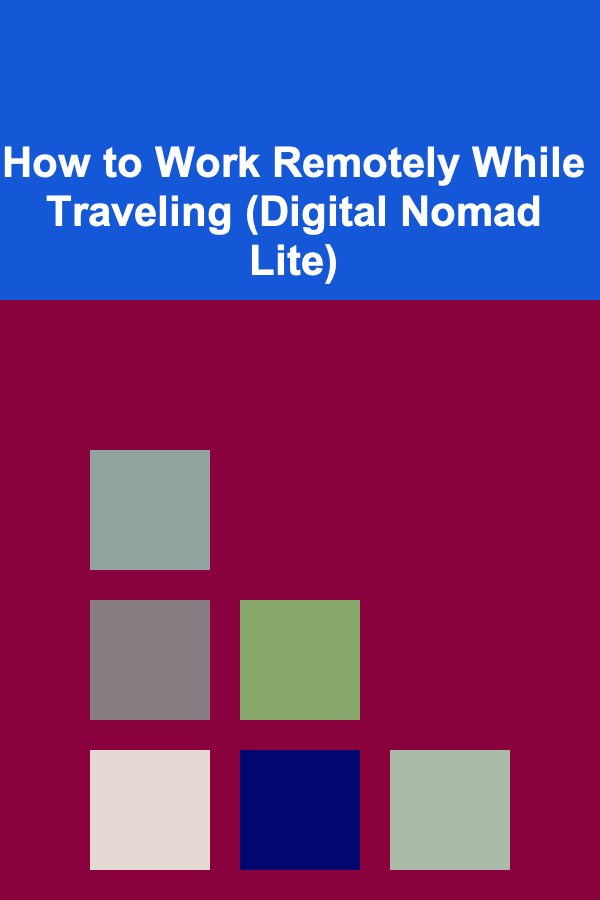
How to Work Remotely While Traveling (Digital Nomad Lite)
ebook include PDF & Audio bundle (Micro Guide)
$12.99$11.99
Limited Time Offer! Order within the next:

In today's fast-paced, interconnected world, the idea of combining work with travel is increasingly appealing. Whether you're a freelancer, a contractor, or someone who simply wants to escape the traditional office environment, the ability to work remotely while traveling is one of the most coveted lifestyle choices. This lifestyle, often associated with digital nomadism, offers incredible flexibility but also comes with its unique challenges. In this article, we will explore how to work remotely while traveling---without necessarily adopting the full-on "digital nomad" lifestyle. This "Digital Nomad Lite" approach is ideal for those who want to maintain the balance between productivity and leisure without fully committing to a nomadic life.
Understanding the Digital Nomad Lite Lifestyle
The term "digital nomad" is commonly used to describe individuals who travel the world while working remotely. Traditionally, digital nomads are entirely location-independent, moving from one country or city to another on a regular basis. However, this constant movement can be exhausting, both physically and mentally. Not everyone wants to be constantly on the move, and many people prefer to combine the joys of travel with periods of stability and routine.
The "Digital Nomad Lite" approach is a more manageable and sustainable alternative. It allows individuals to enjoy the benefits of working remotely while traveling, but without the constant need to hop between locations or endure the stresses that come with a fully nomadic lifestyle. Instead of being fully location-independent, the Digital Nomad Lite style is about achieving a balance---enjoying the freedom of travel while still ensuring that work commitments are met efficiently.
The Key Principles of Digital Nomad Lite
- Work Flexibility: The most important aspect of the Digital Nomad Lite lifestyle is the ability to work remotely. Whether you're working as a freelancer, a remote employee, or a contractor, you need a job that allows you to complete tasks from anywhere.
- Travel at Your Own Pace: Unlike traditional digital nomads, Digital Nomad Lite individuals prefer to travel without the pressure of constant movement. You may spend several weeks or months in one location, exploring new places at a relaxed pace before moving on.
- Routine and Balance: While travel is a significant part of the lifestyle, it's also important to maintain some routine to ensure that work remains productive. This means setting aside dedicated work hours, creating a comfortable workspace, and balancing downtime with productivity.
- Embracing Temporary Living Arrangements: Instead of staying in hostels or constantly moving to new cities, Digital Nomad Lite individuals tend to embrace temporary accommodations like short-term rentals, Airbnbs, or co-living spaces that offer stability during their travels.
- Simplicity and Minimalism: Since you'll be traveling while working, it's essential to streamline your possessions. Having a light, portable set of belongings allows you to travel without unnecessary stress and gives you the freedom to explore new destinations.
Preparing for Remote Work While Traveling
Before embarking on your journey, there are several steps to take to ensure that you're fully prepared for working remotely while on the road. Whether you're a seasoned traveler or new to remote work, following these steps will help set you up for success.
1. Choose the Right Job or Work Arrangement
Not all jobs are suitable for remote work, so it's important to first assess whether your current role or career is adaptable to a traveling lifestyle. Some factors to consider include:
- Location Independence: Your work should not require you to be physically present at a specific location, whether it's an office or a factory. If you're working in a role that requires regular face-to-face interaction or office equipment, working remotely may not be feasible.
- Flexible Hours: The nature of remote work can vary depending on your job. Some jobs allow for asynchronous work, where you can complete tasks at any time of day, while others may require you to work within specific hours (like working with clients or teams in different time zones).
- Skills and Tools: Whether you're a writer, graphic designer, software developer, or marketer, ensure that you have the right skills and tools to work from anywhere. Digital work usually relies on tools such as laptops, internet access, cloud-based file sharing, and communication platforms like Zoom, Slack, or Trello.
2. Create a Robust Work Setup
To stay productive while traveling, you'll need to ensure you have the right tools and environment to work efficiently. This involves:
- Reliable Equipment: At a minimum, you'll need a laptop, a reliable internet connection, and backup devices (such as a smartphone or tablet). Ensure your laptop is powerful enough to run your required software and that you have a good quality webcam and microphone for virtual meetings.
- Work Environment: Finding a quiet and comfortable space to work is essential, whether it's in your accommodation, a café, a co-working space, or even a park. Make sure you can create a distraction-free environment where you can focus on your tasks.
- Tech Solutions for Remote Work: Many remote workers rely on a variety of digital tools to manage their time, tasks, and communication. Project management tools like Asana or Notion, time-tracking software like Toggl, and cloud-based storage like Google Drive are essential for staying organized and efficient.
- Backup Plan: It's wise to have backup solutions in place. For example, if the Wi-Fi at your Airbnb isn't reliable, know where the nearest café or co-working space is, or consider investing in a portable hotspot to ensure you have an internet connection on the go.
3. Plan Your Travel Logistics
While work is important, so is the travel experience. Here are some things to keep in mind when planning your trip:
- Time Zones: Working remotely while traveling means dealing with different time zones. If your job requires you to interact with others (like a team or clients), be mindful of the time zone differences and schedule meetings accordingly. Using tools like World Time Buddy can help you keep track of time zones.
- Accommodation: Find accommodations that meet your needs as a remote worker. Many Airbnb properties offer Wi-Fi and workspaces. Alternatively, you might want to look for co-living spaces that cater to digital nomads, where you can work alongside other like-minded individuals.
- Health and Insurance: When traveling, make sure you have comprehensive health insurance that covers you internationally. Accidents, illnesses, and medical emergencies can occur, so being prepared with insurance is crucial for your safety and well-being.
- Local Culture and Language: It's essential to familiarize yourself with the local culture, customs, and language of your destination. This will not only help you navigate daily life but also enrich your travel experience.
4. Set Realistic Expectations and Boundaries
While working remotely allows for freedom, it's important to set boundaries to maintain a balance between work and leisure. Some common pitfalls to avoid include:
- Overworking: It's easy to get caught up in the idea that you have all the time in the world to work, but this can lead to burnout. Make sure to set working hours and stick to them.
- Underworking: On the other hand, you don't want to fall into the trap of slacking off when you're supposed to be working. Maintaining a routine, even while traveling, will help you stay on track with your responsibilities.
- Balancing Fun and Work: Traveling while working can make it tempting to skip work for sightseeing or other leisure activities. While exploring new places is a major part of the appeal, remember that your work commitments come first.
5. Budgeting for Remote Work and Travel
Budgeting for this lifestyle is essential. Remote work doesn't mean you can just take off without a plan. Here are some tips for budgeting:
- Daily Expenses: Factor in costs for food, accommodation, transportation, and entertainment. Be mindful of how long you plan to stay in each place and the cost of living in that area.
- Emergency Fund: Unexpected events can occur when traveling, such as medical emergencies or travel disruptions. Having an emergency fund will give you peace of mind and financial security.
- Income Streams: Ensure that you have a steady income stream to support your travels. Having multiple clients, diversifying your income sources, or saving a portion of your income before embarking on your journey can help ensure that you don't run into financial difficulties while abroad.
6. Stay Connected and Network
While remote work allows for a certain level of independence, staying connected with colleagues, clients, and others in your field is still important. Here's how you can stay connected while traveling:
- Virtual Networking: Attend virtual conferences, webinars, or workshops to keep your skills updated and your network growing. These events are often easier to attend while traveling, as they eliminate the need to be in a specific location.
- Co-working Spaces and Meetups: Many cities around the world now have co-working spaces that cater specifically to digital nomads and remote workers. These spaces can provide you with an opportunity to network, collaborate, and even meet like-minded people.
- Social Media and Professional Platforms: Use LinkedIn, Twitter, and other social media platforms to stay in touch with colleagues, clients, and industry peers. Posting regular updates on your travels and work can keep you visible in your professional community.
Conclusion
Becoming a digital nomad is no longer just a dream. For many, it's a viable lifestyle choice that combines the freedom of travel with the flexibility of remote work. However, for those who don't want to fully embrace the nomadic lifestyle, the Digital Nomad Lite approach offers a great middle ground. By carefully selecting the right job, preparing your tools and accommodations, setting boundaries, and maintaining a balance between work and leisure, you can successfully work remotely while traveling without sacrificing your career or well-being.
With the right mindset, tools, and strategies, remote work and travel can become a seamless and enriching part of your life. Whether you choose to stay in one location for an extended period or explore new destinations at a slower pace, the Digital Nomad Lite lifestyle allows you to enjoy both work and travel without the overwhelm of constant movement.
Reading More From Our Other Websites
- [Home Security 101] How to Secure Your Backyard from Intruders
- [Organization Tip 101] How to Create a Vision Board That Helps You Stay Organized
- [Home Pet Care 101] How to Maintain Your Pet's Health Through Proper Home Care
- [Home Storage Solution 101] How to Organize Your Home for Easy Cleaning and Efficient Storage
- [Home Holiday Decoration 101] How to Make the Most of Small Spaces with Holiday Decorations
- [Home Maintenance 101] How to Clean and Maintain Your Home's Dishwasher for Better Performance
- [Organization Tip 101] How to Set Up a Family Budgeting and Expense Tracker
- [Home Maintenance 101] How to Maintain Your Home's Fencing and Gates
- [Home Budget 101] How to Budget for a Wedding Without Breaking the Bank
- [Ziplining Tip 101] Side-by-Side Adventures: Why Ziplining is Better When You're Paired Up

How to Designate Zones for Each Season in Your Home
Read More
How to Light Your Home Like a Professional Interior Designer
Read More
How to Repair a Clogged Shower Drain
Read More
How To Start Snowkiting: Kitesurfing on Snow
Read More
Designing 3D Printable Gifts and Gadgets: A Comprehensive Guide
Read More
10 Tips for Teaching Your Cat Tricks: A Fun Training To-Do List
Read MoreOther Products

How to Designate Zones for Each Season in Your Home
Read More
How to Light Your Home Like a Professional Interior Designer
Read More
How to Repair a Clogged Shower Drain
Read More
How To Start Snowkiting: Kitesurfing on Snow
Read More
Designing 3D Printable Gifts and Gadgets: A Comprehensive Guide
Read More